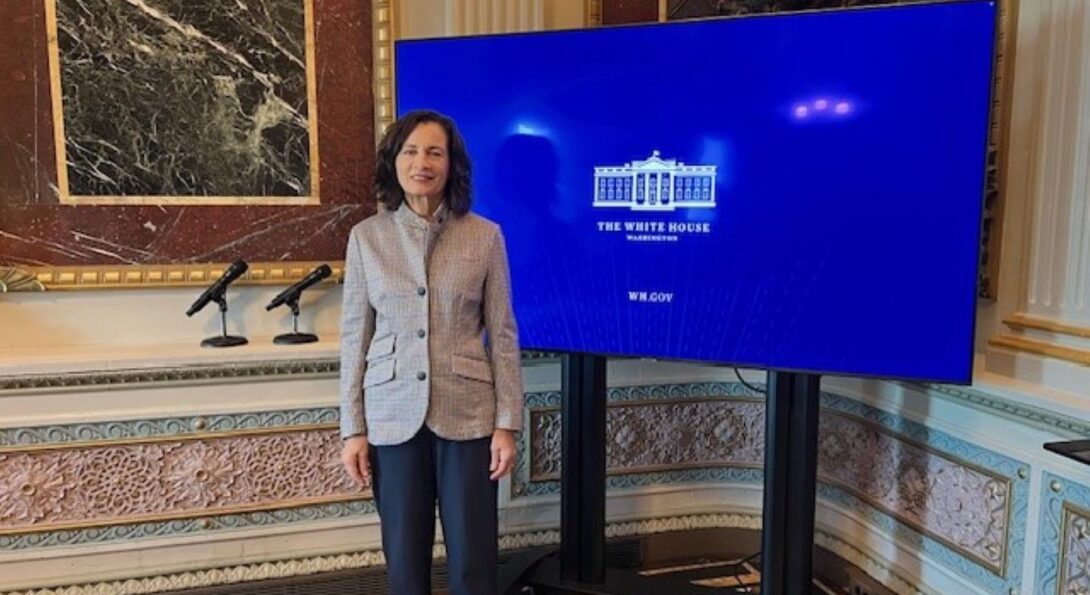Tamar Heller invited to the White House to share remarks on disability accessibility

Tamar Heller was invited to share remarks at the Communities in Action: Building a better Illinois and Indiana Summit at the White House on Thursday, February 1 as part of a White House series that features local elected officials and community leaders working on behalf of their communities to create opportunities and improve people’s everyday lives.
Dr Heller shared the impact the current administration has had on our community by sharing real-life examples and personal stories of local impact with a focus on disability accessibility.
Dr Heller’s remarks below.
Impact of Biden Harris Initiatives on Disability Community in Illinois
As Director of the Institute on Disability and Human Development (University Center of Excellence in Developmental Disabilities) at the University of Illinois Chicago, I will highlight a few examples of the impact of two key initiative of the Biden-Harris administration on the disability community in Illinois: The American Rescue Plan (ARPA), and The Infrastructure Investment Job Act. They focus on expanding accessibility in communities to enable community inclusion, use of technology, health care access, and employment.
American Rescue Plan (ARPA). With the ARPA funds received we were able to host and provide funding to the Chicagoland Disabled People of Color Coalition (DPOCC) founded and co-directed by two disabled people of color (Timotheus Gordon and Jae Jin Pak). DPOCC provide advocacy and networking throughout its activities:
- Created a caucus of BIPOCC Disabled leaders.
- Held annual events (e.g., Juneteenth, resource fair for Black Disabled Entrepreneurship).
- Increased Covid 19 awareness and adherence of guidelines in low-income communities through developing resources and receiving extensive media coverage.
Two personal stories of disabled adults highlight how increased access to assistive technology through our Assistive Technology Unit (ATU) dramatically improved their lives:
- Lisa, who could not speak, transfer out of her bed, was continually denied a communications device by the Medicaid Managed Care Organization (MCO)as she could not speak with them until ATU staff worked with Equip for Equality (the Protection and Advocacy Organization) and legislators to both advocate for her and to change the criteria for receiving the devices. Now she lives in a new apartment with her husband with supports to transfer out of bed, and has a Care Coordinator through her MCO, resulting in improved health care. The ATU staff developed a list of suggestions for Illinois MCOs to consider to ensuring communication accessibility for members with communication disabilities throughout Illinois.
- Daquante, who never had any communication device and had to communicate in writing, which prevented him from getting a job. With the ATU advocacy he was able to get a communication device and receive a computer with built-in accessibility features to support his new job as an information technology specialist.
Infrastructure Inevstment Job Act. Due to the infrastructure bill, monies have been made available to address accessibility of our communities including sidewalks/crosswalks, transportation infrastructure, and web accessibility which benefits persons with disabilities.
The Great Lakes ADA Center have seen the impact of increased attention to implementation and enforcement of the ADA in the activities they are providing:
- Shared resources to practicing planners and policy makers nationally, including working closely with the Chicago Metropolitan Planning Association (CMAP) to provide ADA Training to 280 municipalities.
- Created a database of lawsuits and settlement agreements related to pedestrian infrastructure accessibility. The maps and data resource (including legal research and case law databases) were shared widely in local news articles, government websites, and the Project Civic Access database.
- Helped spur on additional reports and analysis across the US, including evaluating 88 community accessibility transition plans, documenting that 65% curbs in US are not accessible, that less than .5% of intersection have accessible pedestrian signals to assist blind or low vision pedestrians crossing the street, and providing guidelines on how to reduce physical barriers.
- Helped raise the issue among local governments, transportation agencies, Department of Transportation, Metropolitan Planning Organizations, and the US Department of Transportation (DOT). Assistant Professor Yochai Eisenberg is among 24 experts nationwide appointed to the US DOT’s Advisory Committee on Transportation Equity. Illinois DOT and the Chicago Metropolitan Agency for Planning now have dedicated and funded efforts to improve ADA transition planning and implementation in the region.
- Received a 25% increase in contacts with the Center regarding the accessibility of websites, apps and electronic documents, and a doubling of training requests over the past six months since the administration announced rulemaking that will create an enforceable standard for electronic information accessibility under the ADA.